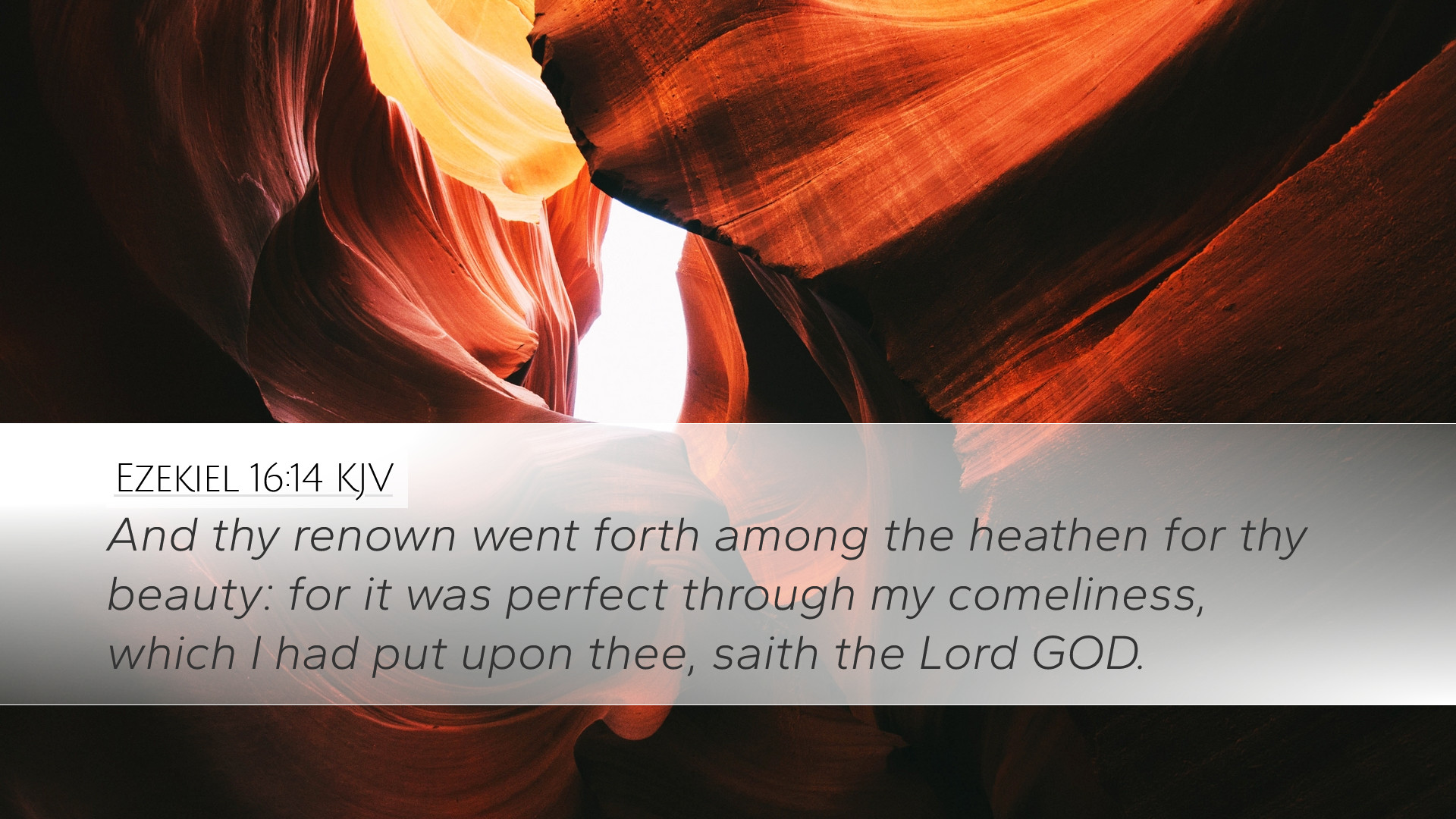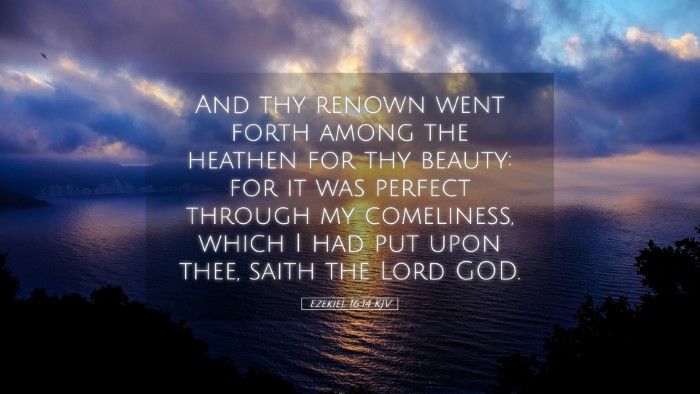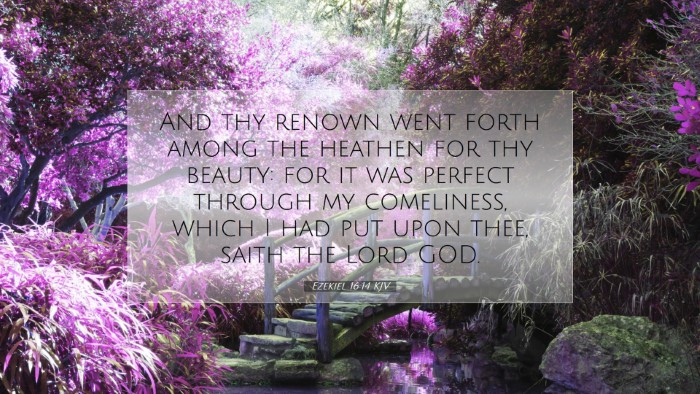Bible Commentary on Ezekiel 16:14
Ezekiel 16:14 (KJV): "And thy renown went forth among the heathen for thy beauty: for it was perfect through my comeliness, which I had put upon thee, saith the Lord God."
The verse captures the essence of God's relationship with Israel, using the metaphor of beauty to reflect His grace and favor. The following commentary distills insights from respected public domain sources, giving a comprehensive understanding relevant for pastors, students, theologians, and scholars.
Overview of the Context
The Book of Ezekiel is known for its vivid imagery and prophetic insights, delivered during a time of national crisis for Israel. Ezekiel, a contemporary of Jeremiah, speaks to a people in exile, offering both judgement and hope. Chapter 16 specifically employs marriage imagery to depict God's covenant with Israel, illustrating the transformation from abandonment to a state of blessedness.
Commentary Insights
Matthew Henry’s Commentary
Renown and Beauty: Henry emphasizes the beautiful nature of God's chosen people, noting that Israel's beauty was not inherent but derived from God's grace. "Thy renown went forth among the heathen" underscores that the admiration for Israel was due to God's covenantal faithfulness and the splendor imparted by Him.
Divine Comeliness: He elaborates on the notion of “my comeliness” which distills the essence of glory attributed to Israel. This beauty was a reflection of holiness, righteousness, and God’s favor, meant to attract the nations not just to Israel but ultimately to the God of Israel.
Albert Barnes’ Notes on the Bible
Nations Aware of Israel’s Beauty: Barnes notes that Israel's fame spread to neighboring nations as a testimony of God's blessings. He asserts that the "beauty" mentioned signifies not only physical attributes but a larger covenantal presence that differentiated God's people from others. There is a clear call to acknowledge that true beauty, as defined by God, is inner purity and devotion.
The Role of God’s Grace: Barnes draws attention to the phrase "which I had put upon thee" highlighting that this was not an earned beauty. Instead, it was a gracious bestowal from God, illustrating a critical theme in biblical theology: that grace results in transformation, and this ultimately serves as a witness to God's nature.
Adam Clarke's Commentary
Implications of Beauty: Clarke interprets the beauty of Israel in light of the blessings and prosperity they received under God's protection. He writes, "The beauty referred to includes the moral and spiritual dimensions" that made them commendable among the nations. Thus, the beauty was intended to evoke a response of reverence and wonder from the surrounding peoples.
Spiritual Significance: Clarke further elaborates that the beauty is emblematic of the relationship between God and His people. When Israel strayed from God's commands, the inherent beauty was tainted. The acknowledgment of this divine transformation reveals how critical it is to maintain fidelity to God to reflect His beauty in our lives.
Theological Implications
This verse addresses vital theological concepts that resonate throughout biblical literature.
- Covenant Faithfulness: It reaffirms God's unwavering commitment to His people. The transformation of Israel’s status from rejected to revered showcases the covenant loyalty that God maintains despite human shortcomings.
- The Nature of Beauty: The text challenges contemporary notions of beauty, forcing a reflection on what constitutes true beauty in the Christian life. It suggests that beauty is intrinsically linked to godliness and holiness.
- Witness to the Nations: The narrative encourages believers to consider how their lives reflect God’s glory. Just as Israel’s beauty served as a testimony to the nations, Christians today are called to reflect Christ, acting as a beacon of hope and transformation.
Application for Today's Church
For modern congregations, Ezekiel 16:14 serves as a reminder to pursue a life reflecting God’s beauty and grace.
- Fostering Community: As God's church, we must cultivate an environment that showcases godliness. Community efforts should aim to exhibit the beauty of Christ in our interactions, mirroring the divine grace afforded to us.
- Outreach and Evangelism: Recognizing that our beauty is a testimony, churches can harness this truth in outreach efforts, understanding that their transformed lives can lead others to seek the God who beautifies our existence.
- Personal Reflection: Individually, believers should seek to cultivate personal godliness, understanding that growth in spiritual beauty attracts both admiration and inquiry from the world.
Conclusion
Ezekiel 16:14 encapsulates a profound truth about identity and purpose, showing how divine grace can transform and elevate a group of people to reflect God's glory. By drawing on historical and theological insights, we are encouraged to not only embrace this beauty in our lives but to actively cultivate a community that radiates the truth of God’s word to the world.


